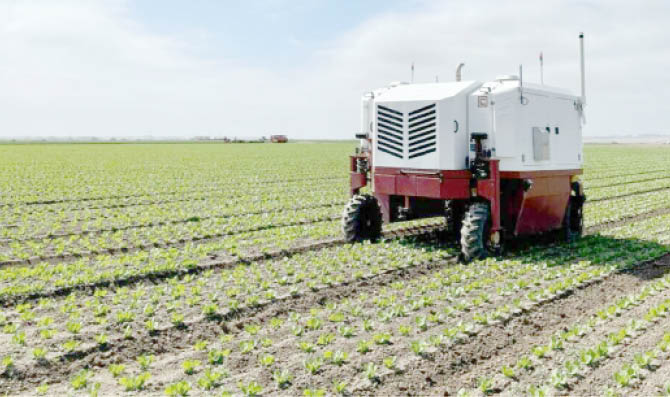AGRO SOLUTIONS: Will laser-weeding robots change farming?
James Johnson has witnessed the wrath of industrial agriculture. For decades, he and his family used fertiliser, herbicides and pesticides to achieve optimal yield on their 3,100-hectare farm in New Mexico. “It was like we had 40, 50 years of success and then suddenly we plateaued and started falling off this cliff,” he said. “I […]

The Laser weeder technology
James Johnson has witnessed the wrath of industrial agriculture. For decades, he and his family used fertiliser, herbicides and pesticides to achieve optimal yield on their 3,100-hectare farm in New Mexico.
“It was like we had 40, 50 years of success and then suddenly we plateaued and started falling off this cliff,” he said.
“I started to look at what we were doing and realised most of it was self-inflicted. We were hurting the biology…and a huge amount of our budget was going towards chemistry.”
In an effort to regenerate the land and eliminate the need for chemical application, the fourth generation farmer – who grows onions, cotton, pistachios and peppers – has been experimenting with other options. One innovative piece of technology he has been using is the autonomous LaserWeeder, an automated machine that Johnson said had replaced the need for weeding fields by hand.
Since 2019, as part of a pilot project for the Seattle tech start-up Carbon Robotics (the company that makes the LaserWeeder), the 9,500-pound machine has been traversing rows on Johnson’s farm. Rolling through the fields at five miles-per-hour with the capacity to clear anywhere from 15 to 20 acres each day, the machines use a combination of laser technology, GPS and Artificial Intelligence (AI) to kill 100,000 weeds per hour.
The machine’s lasers zap the weeds while the GPS, cameras and AI technologies allow the machines to be self-driving and help it differentiate weeds from crops. And because these gadgets use thermal energy to remove the weeds instead of physical intervention like tilling or chemicals, the company says the machine doesn’t disrupt the soil. The LaserWeeder is powered by diesel and burns about 22 gallons in 20 hours, according to Johnson.
Farmers use herbicide on a majority of the world’s agricultural fields and globally spray enough to cover every acre of farmland in the world with half a pound of it each year. The introduction of the LaserWeeder comes at a time when herbicides, and specifically active ingredients like glyphosate, are under scrutiny. A number of studies, for example, have linked glyphosate to negative environmental and public health impacts.
Paul Mikesell, CEO of Carbon Robotics, said the problems had been at the heart of his motivation to develop a product that provided farmers with a better way to manage weed control. With enough robots trucking through pasture, he hopes to have a transformative effect on the food system.
“We can’t keep over-relying on chemicals,” said Mikesell.
“I often think about how exciting it will be to get to the point where over time we can reduce the use of herbicides and pesticides for farmers and to be improving the human health side of things.”
There’s clearly a demand for laser-weeding robots. The company sold out of its 2021 and 2022 LaserWeeder models and has started taking pre-orders for 2023. While Carbon Robotics did not share exact pricing information, Mikesell says the cost is comparable to a mid-size tractor (which can range anywhere between $25,000 and $50,000). While the current model is designed for larger farms of 200 acres to tens of thousands of acres, Mikesell says there are plans in the works to provide an option for small-scale operations; that model will land in 2023 or later.
Carbon Robotics is the only business with a laser-weeding machine on the market at this point. But other emerging start-ups, such as WeedBot in Latvia, told Modern Farmer via email that there are plans to launch other laser-weeding models in the months to come.
Johnson, who is already well acquainted with the technology, believes it’s just a matter of time before laser-weeding robots become a staple on American farms.
Sources: Modern Farmer
